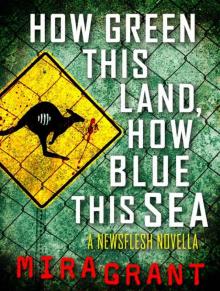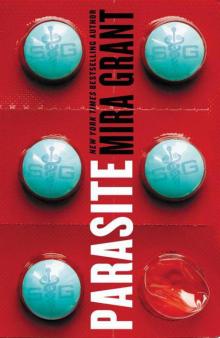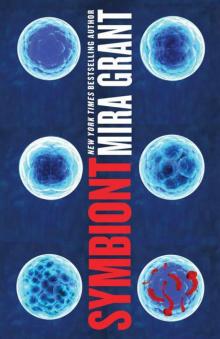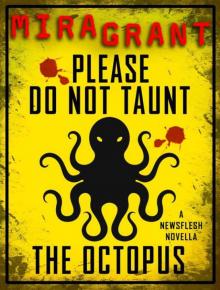- Home
- Grant, Mira
How Green This Land, How Blue This Sea: A Newsflesh Novella Page 2
How Green This Land, How Blue This Sea: A Newsflesh Novella Read online
Page 2
I was still dwelling on that thought as the city outside my window grew rapidly closer, until finally the wheels were touching smoothly down on the runway, executing a perfect landing. Applause rose from the other passengers. Apparently, they didn’t know how much modern air travel depends on autopilot systems, or how unlikely it was that our pilot had done anything to aid that seamless landing.
Ah, well. Let them have their little illusions. I joined the rest of the cabin in applauding. Sometimes it’s the veils that you draw over things that make them worth looking at. Not as honest, perhaps, but certainly more palatable.
Deplaning was a straightforward, if slow, process: The flight attendants unlocked our belts one row at a time, allowing us to leisurely stand, collect our belongings, and head for the jet bridge. No one grumbled about the wait. Some of the people toward the back of the plane were probably seething silently, but there was no point in voicing that sort of thing aloud. All it would do was cause problems, and when the flight attendants are authorized to use deadly force in subduing a “problem passenger,” no one wants to make a fuss.
My bag was a sturdy duffel that had seen stranger trips than this one. I slung it over my shoulder as I exited the jet bridge and started scanning around for signs that would lead me to Customs. Ah, Customs, the first trial of every international traveler.
Large, pleasant signs provided directions, accompanied by helpfully animated arrows that drew lines down the wall, just in case the addled, time-shifted tourists had lost the ability to read. I staggered in the indicated direction, followed by most of the population of my flight. I am quite sure that, in that moment, there was very little to differentiate us from your average zombie mob. No one was moaning, but all the rest of the characteristic signs were there: the slack-jawed expressions, the shambling gaits, and the absolute lack of apparent intelligence.
Eventually, we found ourselves funneled through baggage claim, where I retrieved my suitcase, and into the cattle chutes of Australian Customs and Immigration. As a visitor, I was funneled one way, while returning Australian citizens were funneled another. Their line was more than three times the length of mine. Statistically, Australians make up sixty to eighty percent of the world’s international travel, and Australian nationals are in perpetual demand with multinational corporations in need of mobile executives. An Australian with half my schooling could easily get a job making three times my annual salary, simply because people are willing to pay for an accent that has become associated with survival. It would be irritating, if it wasn’t so comic.
In due time, I reached the front of the line and was confronted by a bored-looking Australian woman whose hair appeared to have been the victim of an unfortunate home perm kit. A piece of clear Plexi separated us. “Please place your passport in the slot, place your hand against the indicated panel, and state your name,” she said.
“Mahir Gowda,” I replied, following her directions. A needle bit into the heel of my hand, followed by a soothing burst of disinfectant spray. No lights came on anywhere that I could see. This was a test that I was going to be taking blind.
“What is the purpose of your visit, Mr. Gowda?”
“I’m a registered Internet journalist, associated with After the End Times,” I said. “I am a British citizen, and have filed the necessary papers to continue my work while visiting Australia. I’m joining some of my colleagues for a tour of the State Barrier Fence.”
That was enough to elicit a spark of interest from the customs officer. “You’re touring the rabbit-proof fence?” she asked. “You do understand that it’s not in a nicely secured, well-populated area, yes?”
“Yes, ma’am, I do, and I think you’ll find that all my clearances are in order.” Assuming I’d filed the correct forms; assuming that Jack and Olivia hadn’t been pulling my leg when they told me this was possible. If I’d just flown to Australia for a prank, well. Looking for a new job was going to be the least of their problems.
“They are,” she admitted, with something that sounded like grudging respect. She pressed a button; my passport emerged from the slot where I’d placed it. “Welcome to Australia, Mr. Gowda. I hope you have a pleasant stay.”
“So do I, ma’am,” I said. “Have a nice day.” Then I was past her gate and walking down the corridor toward freedom, released onto Australian soil at last.
God, did I need a toilet.
4.
There were lavatories situated outside the corridor connecting new arrivals to the exterior concourse. I had one last reunion with the denizens of my plane as I stopped to deal with certain necessary business and then turned myself to the next pressing matter on my agenda: finding my local guides.
The concourse was a dizzying whirl of activity, especially when compared to similar locations in Europe or America. People had actually come into the airport to collect their friends and loved ones. Everywhere I looked, joyous reunions were unfolding, often accompanied by the sound of one or more returning Australians complaining loudly about the condition of the rest of the world. There was something almost self-congratulatory about it. See? it said. We may not be the biggest continent, and we may not have the most people, but we’re the best. We’re the most reasonable. Let everyone else be eaten alive in their beds. Australia will endure.
I stopped in a clear space, turning a slow circle as I tried to get my bearings in this new place. People walked closer than I was comfortable with, some of them actually bumping against my suitcase as they passed me. The Australian idea of personal space was clearly less draconian than it was in the rest of the world.
Halfway through my second turn, I spotted two people hustling toward me across the concourse. Both were clearly Australian, given the way they were navigating through the crowd, squeezing themselves between people without an apparent concern about accidental contact. The man was tall and thin, holding a sign that read GOWDA in one hand as he ran. The woman was shorter, curvy, and had given up holding her sign in a readable position in favor of keeping her iconic Australian slouch hat on her head as she ran.
They stopped about five feet in front of me, both of them plastering broad smiles across their faces and holding their signs out in my direction. I raised an eyebrow.
“Your sign’s backward,” I said to the woman.
“…bugger,” she muttered, and flipped the sign around, adding the message WELCOME, BOSS! to the man’s GOWDA.
“Sorry we’re late,” said the man. “There was a bit of a traffic snarl on the way into the airport. You know how it is when you have to be somewhere in a hurry.”
“Yes, I leave early,” I said, and took a beat to study him. He was about my age, with dark skin and short, dark brown hair cropped close to his scalp. There was a certain indefinable tension about him, like he could do virtually anything at any moment. It was a trait he shared with most of the Irwins I knew. “Jack, I presume?”
A wide grin split his face. “In the flesh. It’s a real honor to finally meet you.”
“I’m not feeling particularly honorable right now. More exhausted, jet-lagged, and in need of a very long shower.” I turned to the woman. Her hair was a shade of blue that occurs naturally only in certain kinds of very toxic frog, although it went well with her eyes. “That means you must be Olivia.”
“Yessir,” she said, pronouncing it as a single word. Her cheeks flushed red. “I mean, er, yes, hello, sir, it’s very nice to meet you, I didn’t mean—”
“It’s all right.” I grabbed the handle of my suitcase. “I assume if you’re both here, the car’s here, too? I’m ready to be out of the limbo of air travel and back among the lands of the living.”
“Right this way,” said Jack. At the same time, Olivia said, “Let me get that,” and stepped forward to make an awkward grab for the handle of my suitcase, resulting in my losing my grip and letting the whole thing tumble to the floor. The three of us stood frozen for a moment, looking at my fallen suitcase. The noise of the concourse continued around us, bu
t where we were, there was silence.
Then, without quite realizing that I was going to do it, I started to laugh.
Jack and Olivia exchanged a nervous look, like they weren’t quite sure how they were supposed to respond to this clear breach of protocol. Then, softly, Olivia giggled. It turned into open laughter. Jack joined in, and the three of us stood there, suddenly at ease, surrounded by weary travelers, and laughed the nerves of a botched first meeting away. I was miles from home, in a place I had never been before, but I was among my people. I was going to be just fine.
5.
Jack Ward, Irwin, and Olivia Mebberson, Newsie, were part of the five-person team that covered Australia—and the only part of that team to live geographically close together. Olivia shared a home outside Melbourne with her husband and wife, while Jack lived near the city center and often used Olivia’s home as a base of operations when he wanted to take trips out into the You Yangs, a nearby series of granite ridges that had been the subject of a yearlong series he’d done for the site. The two had been friends before they ever started working for After the End Times, and while they hadn’t applied as a unit, we had received their applications within minutes of each other.
They were good, hard workers, and their credentials had been above reproach. Still were, which was why, when they’d proposed a piece on the impact of the so-called “rabbit-proof fence” on Australia both before and after the Rising, I’d been willing to fly out for a look. All of us were hoping that this would bring some more attention to our resident Australians, and maybe bring their page hits a little higher in the rankings. For all that many people viewed Australia as the last wild frontier, it was surprisingly difficult to get those same people to pay attention to Australian media. It was like trying to make them care about what was happening on Mars. Sure, it was interesting and all, but it was happening in a place that most of them would never visit or see, and there were more interesting things happening at home.
Jack carried my suitcase out to the car while Olivia chattered on like she was afraid that her license to produce words might be yanked at any moment. I tried responding a few times before I realized my participation wasn’t required. I started merely nodding, and that worked much better for the both of us. We cleared the blood test to exit the concourse, and a second blood test to enter the parking structure. Jack led the way to his car, a sturdy pickup truck with an extended cab capable of seating four. I took the back and was asleep before he could start the engine.
Perhaps sleeping through my first exposure to the city of Melbourne was irresponsible of me, but in my defense, my body—fickle thing that it was—really didn’t give me much of a choice. One minute, we were parked at the airport, and the next, the car was rolling to a stop and Jack was announcing cheerfully, “We’re here. All out for the Mebberson-Yamaguchi residence.”
I mumbled something unintelligible before pushing myself up with one hand and rubbing the other across my face, trying in vain to wipe away the exhaustion and grime of twenty-four hours of constant travel. “How long was I out?”
“About an hour. You’re lucky this isn’t America, mate, or we’d have had to wake you six times for blood tests.” Jack grinned again as he bounded from the driver’s seat, slammed his door, and opened mine. He was far too awake for my tastes, and I couldn’t decide whether to hate him or simply go back to sleep.
“Well, then, all hail Australia.” I sat up, my back protesting every movement. “Ah, damn, I’m getting too old for this shit. Where’s Olivia?”
“She’s inside, getting Zane and Hotaru ready for us. Probably shooing cats off counters and such, so they can make a good impression on you.” Jack stepped away from my open door, crossing to the back of the car.
By the time I convinced my clumsy fingers to unfasten my seat belt and grabbed my duffel from the seat beside me, Jack had retrieved my suitcase from the back of the truck and was halfway to the house. I trudged after him, trying to study the landscape without actually waking up enough to appreciate it. It wasn’t as difficult as it might sound; nothing was going to wake me up enough to appreciate Australia.
It was fall in London, a season of mists and turning leaves, but here, in this strange and distant land, it was the very heart of spring. A thin scrim of green covered the ground, only an inch or so high and still the color of fresh, new growth. Some of the trees on the property were eucalyptus—I recognized them, ironically enough, from the time I’d spent in California with the After the End Times team—but others were entirely new to me. Birds chirped and whistled from their branches, colored in a dizzying array of eye-burning shades.
I stopped walking. “Is that a parrot?” I demanded, unsure whether to be amazed or scandalized by the bird that was eyeing me with avian interest.
Jack called back, “Yup, it’s a parrot. We’ll see more when we hit the road. Now come on. You don’t want to miss the house security system.”
Mention of the security system made me start walking again, now paying attention to the man-made features of my surroundings. A high fence surrounded the house and yard on all sides, and the house itself was a long, low construct, only a single story in height, with surprisingly large windows.
“Don’t let all the glass bother you,” said Jack, as I caught up to him. “There’s automated shutters and retractable bars that automatically descend at night. You’re safe as houses. Olivia and her lot just weren’t willing to sacrifice their view on the off chance that a mob could take out the fence before they got the shutters down.”
“Don’t scare him, Jack,” said Olivia, opening the front door. She didn’t step over the threshold. “The blood test plate is to your right, boss. Once you’ve checked in, you can come and go as you like, unless you’re trying to enter with someone who hasn’t been tested clean within the last six hours. If you leave the property or go over six hours, of course, you have to check clean again.”
“Sensible,” I said, and slapped my hand down against the testing plate. Needles bit into the base of my palm, and a moment later, a small green light clicked on inside the doorframe.
“Come on in,” said Olivia. “Zane and Hotaru are very excited to meet you.”
“I’m terribly sorry for them, then,” I said, smothering another yawn. “I’m not exactly at my best right now.”
“We understand jet lag,” said a tall, barrel-chested man whose bushy red mustache had been the subject of more than a few cheerful meme explosions started by Olivia. He offered me his hand, and I noted dispassionately that he was almost a foot taller than I was. “Zane Mebberson-Yamaguchi. It’s a real pleasure to finally meet you.”
“Mahir Gowda,” I said, slipping my hand into his, where it was engulfed by his fingers. “Thank you for your hospitality.”
“That’s on Olivia,” he said, shaking once before letting me go. “She said her boss was coming to the country, and she couldn’t exactly ask him to stay at a hotel, so would we mind? As if we could tell her no.”
“You could, but you’d wake up with spiders in your bed,” said Olivia, walking by and leaning up onto her absolute tiptoes. Zane ducked his head, allowing her to kiss his cheek.
“I already wake up with spiders in my bed,” he said. “Find a better threat.”
Rather than pay attention to their banter—which had the long-practiced feel of a call and response, the sort of private patter that partners tended to develop over long periods of time—I turned and studied the living room. It was surprisingly normal; except for the windows, it could have been placed in any American or British home and fit right in. There was a large entertainment center in one corner, with a stationary bike discreetly folded and tucked off to one side. About a third of the room had been sectioned off with a metal bookshelf, forming a private workspace.
“That’s mine,” said an unfamiliar female voice. I turned from my consideration of the workspace. A slim young Japanese-Australian woman had entered the living room, a pillow under one arm. She had red and blue stre
aks dyed in her shoulder-length black hair; the blue matched Olivia’s closely enough that it was doubtless from the same bottle. “You must be Mr. Gowda. Olivia’s told us so much about you.”
“And you must be Hotaru.”
“Exactly.” Her smile was wide and warm. “Your room’s ready for you, except for the pillow, which is here.” She held it out to me. “Welcome to Australia.”
“I’m thrilled to be here,” I said, taking the pillow. “Now, if someone would show me where I’m meant to be sleeping, I’d like to go pass out until I feel secure in my ability to remember any of this.”
Olivia laughed. “Come on,” she said. “It’s this way.”
“Oh, thank God,” I muttered, and followed her down the hall, away from the already-chattering cluster of people, until we reached a small, blessedly dark room. There was a single twin bed pressed up against the wall, and in that moment, it seemed larger and more welcoming than any bed that I had ever seen. My suitcase was already there, next to the nightstand. Jack must have moved it while I wasn’t looking.
“Do you need anything?” Olivia asked.
“Just sleep,” I said.
“I’ll leave you to it, then,” she said, and shut the door behind herself as she left the room.
Improbable as it seems, I truly believe that I was asleep before my head hit the pillow, and I celebrated my arrival in Australia by falling into a deep, dreamless unconsciousness.
Part II:
A Fantastic Voyage into the Land of Venomous Snakes, Improbably Large Spiders, and Marsupials

 How Green This Land, How Blue This Sea: A Newsflesh Novella
How Green This Land, How Blue This Sea: A Newsflesh Novella Parasite (Parasitology)
Parasite (Parasitology) Symbiont (Parasitology Book 2)
Symbiont (Parasitology Book 2) Please Do Not Taunt the Octopus
Please Do Not Taunt the Octopus